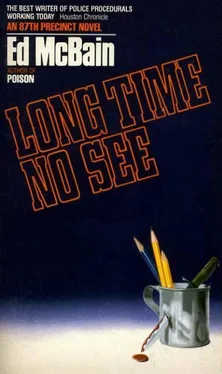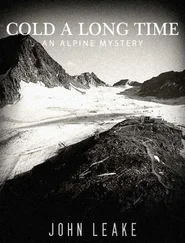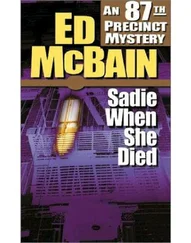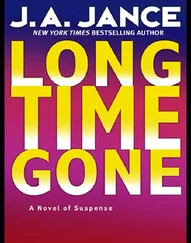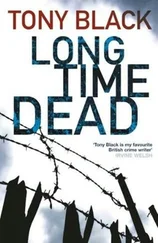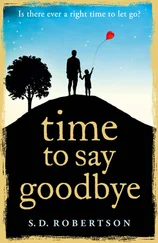“It gives him the authority to search for a dog bite,” the legal officer said. “General Kihlborg’s already approved the search.”
“Would you mind stripping down?” Carella said.
“This is ridiculous,” Tataglia said, but he began disrobing. There were no wounds on either of his arms, but there was a bandage on his left leg, just above the ankle.
“What’s that?” Carella asked.
Standing in his khaki undershorts and tank-top undershirt, Tataglia said, “I cut myself.”
“Would you take off the bandage, please?” Carella said.
“I’m afraid it’ll start bleeding again,” Tataglia said.
“We’ve got a doctor here,” Carella said. “He’ll remove the bandage, if you prefer.”
“I’ll do it myself,” Tataglia said, and slowly unwound the bandage.
“That’s not a cut,” Carella said.
“It’s a cut,” Tataglia said.
“Then what are those perforations?”
“I don’t know what you mean.”
“Those are teeth marks.”
“Are you a doctor?” Tataglia asked.
“No, but anyone can see those are teeth marks.” He turned to the medical officer. “Major,” he said, “are those teeth marks?”
“They could be teeth marks,” the major said. “I would have to examine them more closely.”
“Would you do that, please?” Carella asked.
The major went to a stainless-steel cabinet, opened the top drawer of it, and took out a magnifying glass. “Would you get up on the table here?” he asked. Tataglia climbed onto the table. The doctor adjusted an overhead light so that it illuminated the wound on Tataglia’s leg. He peered through the magnifying glass. “Well,” he said, “the wound could have been caused by the action of canine teeth and cutting molars. I can’t say for sure.”
Carella turned to the legal officer. “Colonel,” he said, “I’d like to take this man into custody for further examination by the medical examiner and for questioning regarding three homicides and an attempted assault.”
“Well, we’re not sure that’s a dog bite,” the legal officer said.
“It’s some kind of an animal bite, that’s for sure,” Carella said.
“That doesn’t make it a dog bite. Your court order specifically authorizes search for a dog bite. Now, if this isn’t a dog bite...”
“Your medical officer said the wound might have been caused—”
“No, I said I couldn’t be sure,” the medical officer said.
“All right, what the hell’s going on here?” Carella asked.
“You want me to release this man from military jurisdiction,” the legal officer said, “and I’m just not—”
“Only pending the outcome of our investigation.”
“Yes, well, I’m not sure I can do that.”
“Do I have to get a district attorney out here?” Carella said. “Okay, I’ll call the city and get one out here. Where’s the phone?”
“Take it easy,” Colonel Humphries said.
“Take it easy, shit!” Carella said. “I’ve got a man here who maybe killed three people, and you’re telling me to take it easy? I’m going to arrest this man if I’ve got to get the President on the phone, now how about that? He’s Commander in Chief of the—”
“Just take it easy,” Humphries said again.
“What’s it going to be?” Carella said.
“Let me talk to the general,” Humphries said.
“Go ahead, talk to him.”
“I’ll be back,” Humphries said, and went into the next room.
Carella could hear the sound of a telephone being dialed. He began pacing. The Army officers looked through the window to the quadrangle beyond, avoiding his eyes. Tataglia had rebandaged his leg and was putting on his clothes again when Humphries came back into the room.
“The general says it okay,” he said.
It wasn’t that easy.
The legal officer went along with Tataglia to protect his rights, as was usual in this country — and which wasn’t so bad when you got right down to it. Because supposing Tataglia wasn’t the man who’d killed Jimmy and Isabel Harris, not to mention Hester Mathieson, huh? Suppose he wasn’t the man who’d attacked old Eugene Maslen and been bitten by his dog Ralph? Suppose he’d been bitten instead by his wife or his pussycat, huh? That was why it was necessary to have Lieutenant Colonel Anthony Loomis there to make certain the cops of the 87th did not work Tataglia over with rubber hoses — which cops nowadays didn’t do, but which Loomis didn’t know.
When Carella asked that a sample of Tataglia’s blood be taken to compare with the blood that had been found on the sidewalk outside the Mercantile Bank on Cherry and Laird, Lieutenant Colonel Loomis said he felt this was a violation of Tataglia’s rights. An assistant district attorney named Andrew Stewart was up at the squadroom by then because this looked like real meat and they didn’t want a multiple murderer to get away with murder even if his counsel was a hard-nosed career Army officer who also objected to a medical examiner taking a look at the wound to determine whether or not it was a dog bite. Stewart was a hard-nosed career man who hoped one day to become governor of the state. He had served with the United States Army during one of his nation’s many wars, and he did not like officers and he especially did not like lieutenant colonels.
“Colonel,” he said, because that’s what lieutenant colonels were called in the United States Army, “I think I ought to let you in on a few secrets here before you find yourself behind enemy lines without support.” He smiled like a chipmunk when he said this because he thought it was a pretty good metaphor, which in fact it was. “I am going to tell you all about Miranda-Escobedo and the rights of a prisoner. Or rather, since everybody nowadays talks about the rights of prisoners, I am going to tell you about the rights of law-enforcement officers. So pay attention, Colonel—”
“I don’t like your condescending air,” Loomis said.
“Be that as it may,” Stewart said, and smiled his chipmunk smile again. “Let me inform you that a police officer may properly ask a prisoner to submit to a blood or breath-alyzer test, to take his fingerprints or to photograph him, to examine his body, to put him in a line-up, to ask him to put on a hat or a coat, or to pick up coins or put his finger to his nose or any thing of the sort without warning him first of his privilege against self-incrimination or the right to counsel.”
“That is your interpretation,” Loomis said.
“No, that is the interpretation of the Supreme Court of this land, Colonel. The difference between any of these actions and a statement in response to interrogation is simply the difference between nort-testimonial and testimonial responses on the part of the prisoner. The first need not be preceded by the warnings; the second must always be. So, Colonel, whether you like it or not, we’re going to take a sample of Major Tataglia’s blood, and we’re also going to have an assistant M.E. look at that wound in an attempt to determine whether or not it was inflicted by a dog. Now that’s it, Colonel, and we’re well within our rights, and you can object till hell freezes over, but we’re still going to do it. Is that clear?”
“I am objecting,” Loomis said.
“Fine. And I ’ m calling the Medical Examiner’s Office to arrange for a man to get here right away.”
The assistant M.E. arrived some forty minutes later. It was now close to nine p.m. He looked at the wound and said it appeared to be a dog bite. He then asked if the dog was rabid.
“Yes,” Carella said.
Читать дальше
